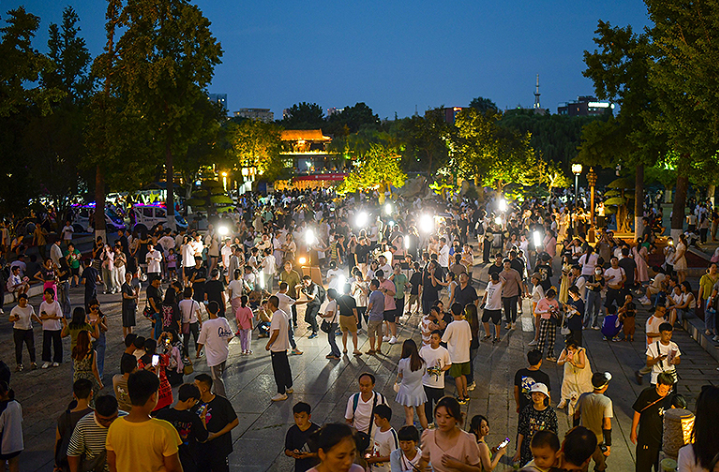Night-time consumption and water parks have become massive draws for tourists amid scorching temperatures across China during the summer holiday season.
The July tourist market extended the popularity of this year’s Labor Day holiday in May and the Dragon Boat Festival break last month. Domestic orders for hotels and guesthouses, scenic spot tickets, transportation, and so forth doubled from July 1 to 10 compared with the same period of 2019, according to data from shopping apps Meituan and Dianping.
Meituan’s data showed that the search volume for popular aquatic sports such as swimming, rafting, and water parks surged. Hotels with the keywords ‘swimming pool’ were preferred, with reservations up about 250 percent from the same time in 2019.
Visitor numbers to Chengdu Sunac Water Park in Sichuan province were 32 percent higher than normal in the first two weeks of the summer vacation, averaging 4,500 a day for a 27 percent gain on a year ago, according to General Manager Liu Ying. Numbers are set to peak at the end of this month, he told.

Water Parks, Night-Time Consumption Become Tourist Hotspots in China’s Heatwave
On the Dianping app, travel notes recommending ‘indoor water parks’ with keywords ‘playing in water’ and ‘indoors’ soared nine-fold annually, official data showed.
Tourism markets in coastal cities have seen a spurt. Take Weihai in Shandong province, for example. Summer vacation orders rocketed more than 500 percent from 2019. And other coastal cities like Qingdao, Dalian, Xiamen, Qinghuangdao, and Haikou also enjoyed a huge surge in orders and prices.
Amid the torrid weather, tourists are also choosing to stay put in the daytime and have fun out at night. The Guanyinqiao business district in Chongqing had about a 60 percent jump in night consumption year on year, Meituan and Dianping data showed. The top five cities with the highest night-time spending were Shanghai, Beijing, Chengdu, Shenzhen and Guangzhou, respectively.
Wang Junjie, owner of a restaurant in Qingdao, told Yicai Global that compared with noon, the increase in night spending has been more obvious during this summer break. “Daytime sales contribute about 20 percent of our total, with the rest from night-time consumption,” he said, adding that “the restaurant is busiest between 7 p.m. and 11 p.m. everyday.”














